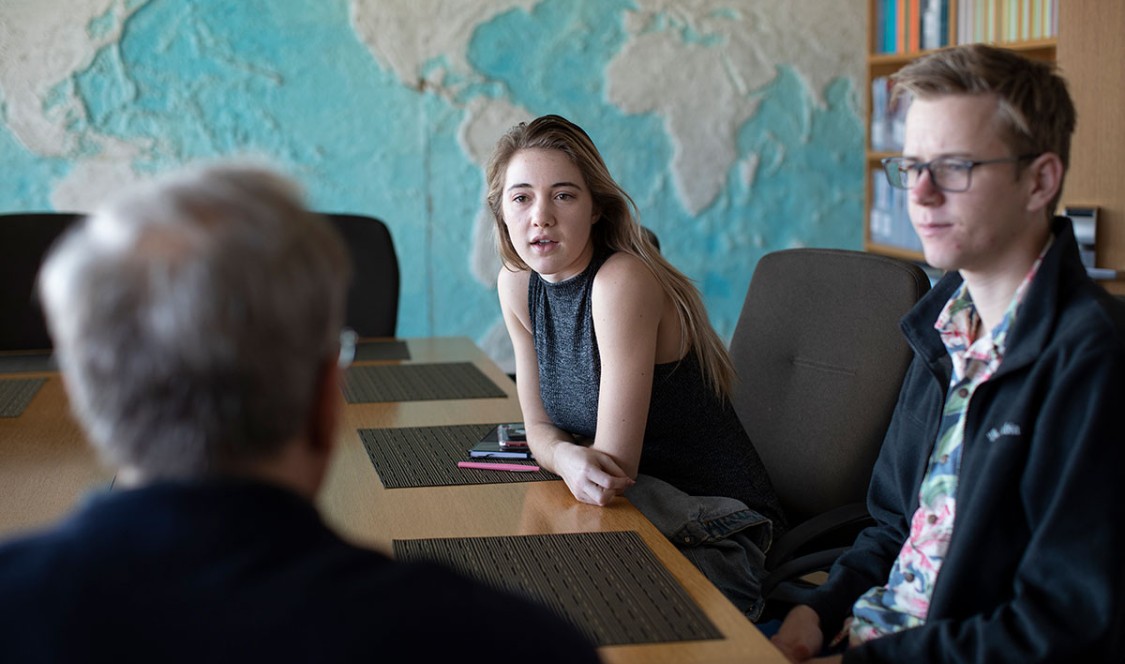It was the most exhausted Charlie Harris ’19 felt at CMC. And his brain loved every minute of it.
This past fall, Harris and 11 other 5C students were selected to participate in an inaugural Salvatori Center seminar centered on a complex, contemporary question, “Will Capitalism Destroy Itself?” The Saturday roundtable (the first of two on different topics slated for this academic year) re-engages with a liberal arts approach that can get lost in a sea of graded papers and structured syllabi, said George Thomas, director of the Salvatori Center.
WHY FREE SPEECH?
The Salvatori Center will host its second seminar, “Why Free Speech?” with CMC literature professor Seth Lobis, on Saturday, March 2, at the Kravis Center.
The Salvatori Seminars are designed to facilitate student discussion about contemporary issues by exploring their philosophical roots. Students are paid a stipend of $125 for participating.
Learn more about the “Free Speech” readings and schedule online.
“For the seminar, I wanted students to spend a Saturday, totally independent of their classes, just wrestling with ideas. There were no expectations for what they might be thinking beforehand or where they might go with this after. It could be a one-time deal with other students they’d never see again,” said Thomas, Burnet C. Wohlford Professor of American Political Institutions.
“Instead, we kept the goal simple. Let’s grapple with something intellectually big and interesting.”
Thomas sent out the first trial balloon with Eric Helland, William F. Podlich Professor of Economics and a George R. Roberts Fellow. They landed on an all-day seminar wrapped around the intentionally provocative question about capitalism. More than 50 students applied, and Thomas looked for a wide cross-section of disciplines and interests across the consortium. Once the group was picked, Helland assigned material ranging from Adam Smith to Karl Marx to John Rawls as starting points for discussion. The readings were meant to “quarrel with one another,” Thomas said, so students could have an informal yet informed discussion about the totality of capitalism.
“When you’re in a semester long class, a lot of times you’re looking at narrow slices of a broader topic. It’s rare to have the time to take on a central question and really evaluate all of its nuances,” said Harris, a philosophy, politics, and economics major. “We were talking for 10, 11 hours—even through lunch and dinner—and the discussion kept crossing the spectrum of all these ideas we had been introduced to, but never had the chance to engage with deeply as students.”
Paloma Palmer ’19, a fellow PPE major, said that because the room was self-selecting, it added a ”tournament feel” among peers who appreciate intellectual jousting. She also felt that the Saturday seminar achieved Thomas’ aim of replicating an atmosphere where students are free to volley with a professor during office hours, only with more intentionality.
“We all wanted to be there. We all like having these kinds of conversations in our free time,” Palmer said. “The seminar was so small and contained, so precise with certain readings as conversation starters, that it really allowed us to focus in a meaningful way.”
The seminar also taught Helland, at CMC since 1998, a few new tricks. He was still guided by old classroom habits while arriving for the weekend seminar—“If I assigned readings, I have to talk about them, right?” But Helland quickly learned that this was a unique space for exploration. He often let students run with their analysis and opinions, even as he anticipated they might head off a cliff.
That was the point, though. Without grades, papers, or final judgments, everyone could embrace open, candid discussion and challenge ideas. Those are life skills that extend well beyond CMC, Helland said.
“This is exactly how 18- to 22-year-olds in college should be thinking about interesting things. Students got a lot of joy just talking about ideas without the need for classroom structure. It felt very organic,” said Helland, who believes the seminars could eventually serve as an incubator for CMC course offerings.
“I don’t know what Charlie, Paloma, and the other students will end up doing in the future. But I believe what they gained from this one-touch seminar—processing information, having discussion with peers they may not have known, and being encouraged to put their ideas in the open—will be useful to them, even if the topic of capitalism never comes up again.”
—Thomas Rozwadowski

